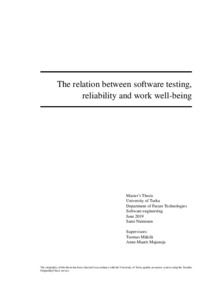The relation between software testing, reliability and work well-being
Nieminen, Sami (2019-06-13)
The relation between software testing, reliability and work well-being
Nieminen, Sami
(13.06.2019)
Julkaisu on tekijänoikeussäännösten alainen. Teosta voi lukea ja tulostaa henkilökohtaista käyttöä varten. Käyttö kaupallisiin tarkoituksiin on kielletty.
avoin
Julkaisun pysyvä osoite on:
https://urn.fi/URN:NBN:fi-fe2019061921384
https://urn.fi/URN:NBN:fi-fe2019061921384
Tiivistelmä
Over the last decades, software development has evolved from slow and tedious to swift and agile process which has enabled the easy and customer-centric development of new applications. Being able to interact wirelessly with almost any household item or share memories and media with shorter latencies than ever raises the importance of proper and safe software. The software development principles are not the same they were even twenty years ago but instead they keep constantly evolving and industries come up with better ways to deliver exceptional products for a wider and more demanding audience.
Testing is unquestionably one of the most valuable factors of software development which unfortunately is too often neglected and forgotten. Many organizations struggle to keep their code maintainable which in the worst case can have devastating consequences risking the whole business. Tests are the key factors that can when done properly, reflect the quality of the software and could even increase productivity.
Work environment, happiness, and well-being during the development phase could massively influence the quality of the software. This thesis explores the possible connection between well-being and software development and attempts to find the answer to whether work well-being could be improved solely by proper testing.
To study this claim a questionnaire was conducted by collecting responses from software developers with different backgrounds and experiences. The goal of this thesis was to produce a valuable insight to software developers and companies about the phenomenon which can possibly be used to improve the quality of life of workers and software. The results indicate that different types and number of testing tools do have a connection on how an individual feel about their work and projects.
The data would hopefully encourage other researches to perform more profound studies around the topic but also to promote companies and individual developers to evaluate their tools and processes.
Testing is unquestionably one of the most valuable factors of software development which unfortunately is too often neglected and forgotten. Many organizations struggle to keep their code maintainable which in the worst case can have devastating consequences risking the whole business. Tests are the key factors that can when done properly, reflect the quality of the software and could even increase productivity.
Work environment, happiness, and well-being during the development phase could massively influence the quality of the software. This thesis explores the possible connection between well-being and software development and attempts to find the answer to whether work well-being could be improved solely by proper testing.
To study this claim a questionnaire was conducted by collecting responses from software developers with different backgrounds and experiences. The goal of this thesis was to produce a valuable insight to software developers and companies about the phenomenon which can possibly be used to improve the quality of life of workers and software. The results indicate that different types and number of testing tools do have a connection on how an individual feel about their work and projects.
The data would hopefully encourage other researches to perform more profound studies around the topic but also to promote companies and individual developers to evaluate their tools and processes.
